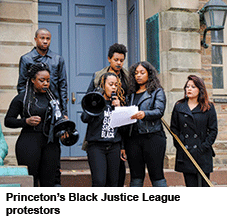 Visiting some American universities these days feels like touring the scene of an earthquake, or a small war. Though administrators insist the protests across campuses in the past year were therapeutic, grievances seethe. Fears for jobs, and of harm — both reputational and physical — endure. “The campus is traumatised,” says Reuben Faloughi, one of the leaders of the protests which, last November, forced the University of Missouri’s president to resign.
Visiting some American universities these days feels like touring the scene of an earthquake, or a small war. Though administrators insist the protests across campuses in the past year were therapeutic, grievances seethe. Fears for jobs, and of harm — both reputational and physical — endure. “The campus is traumatised,” says Reuben Faloughi, one of the leaders of the protests which, last November, forced the University of Missouri’s president to resign.
The protesters believe they are pursuing social and racial justice, in part by changing the way America remembers its past — debates that are convulsing the country at large. For others the right at stake is freedom of speech, a principle imperilled around the world. As Nicholas Christakis, a Yale professor, caught up in the turmoil, puts it: “If we can’t get that right at our elite universities, we’re doomed.” How far these values are compatible, and whether their advocates can listen to each other, are quandaries these events have dramatised.
Still, the main grievance racking American campuses is alleged racism. Several student groups demand more pluralistic curriculums, cultural-awareness training for staff, more diverse faculties and extra facilities for minorities. Students and their sympathisers think free speech is sometimes invoked to deflect these claims; or, so Princeton’s Black Justice League maintains, as a “justification for the marginalisation of others”. Echoing debates over memorials across the nation, many students have demanded that the slavery-tainted names of college buildings be changed. Some Princetonians want the public-policy school to honour someone other than Woodrow Wilson, a president who was a segregationist, albeit an idealistic promoter of world peace. Some Yalies object to Calhoun College commemorating a pro-slavery ideologue and statesman.
These requests are regarded by others as efforts to sanitise history. Announcing its recent decision to retain Calhoun’s name, Yale said that doing so would serve as a teaching aid. Princeton, too, has chosen to keep Wilson’s name, though a dining-hall mural of him, smiling and holding a baseball, has been scrubbed out. Both made compensating offers of explicatory artwork and exhibitions, while Yale promised to name a new college after Pauli Murray, a civil-rights leader.
At the heart of this dispute is the role of the university itself. Should it shield youngsters from the fraught world they will soon enter or, by exposing them to its affronts, prepare them for it? This has a corollary: whether a student is an adult, or an in-betweener needing special protection and privileges (such as the right to spend a lot of time in the library and getting drunk). All of the above, say diplomatic university bosses. Some students, though, seem to emphasise incubation over preparation; hence their requests for more reprimands and intrusion, for supposedly improving bans and rules. What really distinguishes them from their predecessors, say their critics, is not solipsism, impatience or a certainty that can slide from admirable passion into self-righteousness, but the expectation that all their problems should be magicked away. Whereas, as Dr. Christakis says, universities “cannot readily deliver utopia, much as we might want to”.